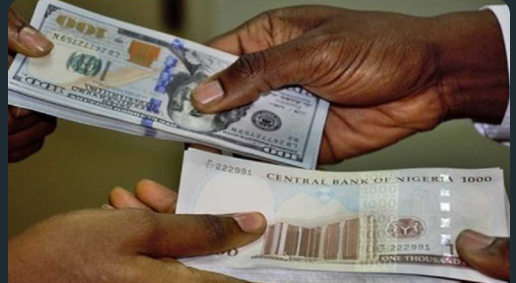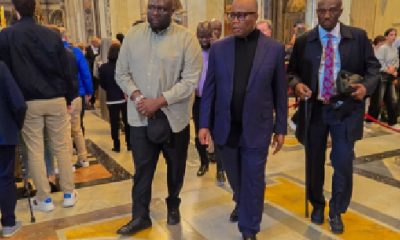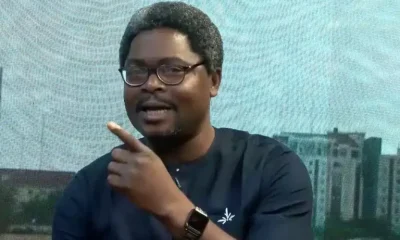Economy
Nigeria, others lose $1.6bn daily to illicit flows – AfDB

Akinwumi AdesinaThe African Development Bank has revealed that the continent loses about $1.6bn every day to illicit financial flows and profit shifting on the part of multinationals operating in Africa.
This was disclosed by the Chief Economist of AfDB, Kevin Urama, in an exclusive interview with The PUNCH.
According to the International Monetary Fund, illicit financial flows refer to the movement of money across borders that is illegal in its source (e.g. corruption, smuggling), its transfer (e.g. tax evasion), or its use (e.g. terrorist financing).
For decades, the IMF has played a key role in international efforts to combat these opaque and often destabilising transfers. It also has longstanding concerns with flows that are not strictly illegal but are associated with tax avoidance
Urama said that Africa was losing more than it was getting back via Foreign Direct Investment and said that the focus of stakeholders should be on blocking the outflow rather than chasing inflows.
He said, “There are so many things that happen on the continent that actually make corruption a big issue. And some estimations show that Africa loses about 248 billion US dollars every year due to corruption. If you add illicit financial flows of over $90bn and add profit shifting; corporates operating in Africa but then maybe have headquarters somewhere else and they find clever accounting ways of legally not paying taxes. In Africa, we are losing about $275bn. When you sum all these up, these are things you can trace through banks, then you find that Africa is losing about $587bn every year.
“That’s about $1.61bn every day. Yet we spend all our time chasing FDI, foreign direct investment, official development assistance, portfolio flows and remittances. All these together during the year we did this study for 2022 was about $174.5bn. That’s less than three times, I mean what we are losing is three times more than what we are getting from the global market. So how do we engage with the global market? Are we not focusing on the wrong priorities? Because if you ask me if I’m losing almost $600bn, I will focus on how not to lose it instead of going to get more. Tackling it, is what we are doing.
Highlighting some of the ways to shut the door on the outflow, Urama said, “It all comes down to the quality of institutions, the accountability systems for institutions, the capacity of individuals in government, in public service to first understand the implications of decisions they make but also to have the tools, the regulations, the policies and principles and technologies to be able to track it down and stem it.
“And that is why in the African Development Bank, we not only are developing these issues on debt but we’ve also now developed what we call a Public Service Delivery Index for Africa which measures the quantum of public services delivered in all key sectors of development but also the perceptions of the citizens on how that public service is. You may say you have provided electricity to me because you put a pole and wires passed behind my house, but maybe I have not been able to connect.”
Illicit financial flows were one of the reasons Nigeria has been on the greylist of the Financial Action Task Force since February 2023.
However, the Nigerian Financial Intelligence Unit in October said that FAFT had approved the fourth progress report of the country at its last plenary meeting.
Speaking on the sidelines of the last IMF’s annual meetings in Washington, Deputy Governor, Central Bank of Nigeria, Philip Ikeazor reinforced the commitment to exiting the grey list, saying, “Practically sending money home is impossible and if we are talking about driving remittances and FDI’s then we need to get out of the Grey List.”
The CBN Governor, Yemi Cardoso outlining measures to meet this target, said stronger oversight and collaboration with international money transfer operators and Nigeria’s diaspora were key.
Economy
More Nigerians to experience poverty by 2027 – World Bank

The World Bank’s latest Africa’s Pulse report has projects a grim future for Nigeria, with poverty expected to rise by 3.6 percentage points by 2027.
Released during the IMF and World Bank Spring Meetings in Washington, DC, the report cites Nigeria’s reliance on oil, economic fragility, and governance challenges as key drivers.
It highlights the country’s structural economic weaknesses, dependence on oil revenues, and national fragility as key barriers to meaningful poverty reduction.
“Poverty in resource-rich, fragile countries, including large economies like Nigeria and the Democratic Republic of Congo, is projected to increase by 3.6 percentage points between 2022 and 2027,” the report stated.
Despite recent growth in Nigeria’s non-oil sector during the last quarter of 2024, the World Bank warns that this progress is unlikely to translate into widespread poverty alleviation due to ongoing fiscal and institutional challenges.
The report emphasizes that Sub-Saharan Africa remains the world’s poorest region, with an overwhelming 80% of the globe’s 695 million extreme poor residing there in 2024.
Within the region, half of the 560 million extremely poor people were located in just four countries, including Nigeria.
In stark contrast, South Asia accounted for 8% of the world’s extremely poor population, East Asia and the Pacific 2%, the Middle East and North Africa 5%, and Latin America and the Caribbean 3%.
The World Bank attributes the rising poverty in Nigeria and similar economies to weakening oil prices and fragile governance structures, noting: “This follows a well-established pattern whereby resource wealth combined with fragility or conflict is associated with the highest poverty rates, averaging 46% in 2024, which is 13 percentage points higher than in non-fragile, resource-rich countries.”
Meanwhile, non-resource-rich countries in Africa are experiencing stronger economic growth and faster poverty reduction, buoyed by high agricultural commodity prices and more resilient fiscal policies.
To reverse Nigeria’s downward poverty trend, the World Bank recommends reforms that prioritize inclusive economic growth and stronger public financial management.
It calls on the government to focus on “improving fiscal management and building a stronger fiscal contract with citizens to promote inclusive economic development and long-term poverty alleviation.”
Economy
SEE current exchange rate of the Dollar to Naira

What Is the Dollar to Naira Exchange Rate at the Black Market (Aboki FX)?
Here is the Dollar to Naira exchange rate at the parallel market, popularly known as the black market (Aboki fx), for Tuesday, April 23, 2025.
You can exchange your dollars for naira at the following rates:
Black Market Exchange Rate (Lagos – April 23, 2025):
According to sources at the Bureau De Change (BDC), the exchange rate at the Lagos parallel market saw traders buying at ₦1610 and selling at ₦1620 per US dollar.
It’s important to note that the Central Bank of Nigeria (CBN) does not recognize the black market. The CBN advises individuals seeking foreign exchange transactions to do so through their banks.
Dollar to Naira Exchange Rates
Market Type Buying Rate Selling Rate
Black Market ₦1610 ₦1620
CBN Official Rate ₦1591 (Low) ₦1606 (High)
Note: Forex rates vary across dealers and regions, and actual rates may differ from those listed.
Meanwhile, the Nigeria Customs Service (NCS) has announced the seizure of 298 smuggled items worth ₦7.6 billion between January and March 2025. The NCS also disclosed that it generated a total revenue of ₦1.75 trillion in the first quarter of the year.
Economy
Volvo announces termination of 800 U.S. workers, cites tariff, market decline

Volvo Group has announced plans to lay off up to 800 workers at three of its U.S. facilities over the next three months, citing ongoing market uncertainty and declining demand exacerbated by tariffs introduced under the administration of President Donald Trump.
The affected locations include the Mack Trucks plant in Macungie, Pennsylvania, as well as Volvo Group sites in Dublin, Virginia, and Hagerstown, Maryland.
In a statement on Friday, Volvo Group North America confirmed that between 550 and 800 employees would be impacted.
The company, a subsidiary of Sweden’s AB Volvo, employs nearly 20,000 people across North America.
The layoffs come amid wider turmoil in the automotive and manufacturing sectors, as shifting U.S. trade policy and a series of tariffs continue to drive up production costs. Economists have pointed to the uncertainty surrounding Trump’s trade strategy as a factor undermining both business and consumer confidence, with concerns mounting over a potential economic slowdown or recession.
According to Volvo, the company is grappling with a decline in heavy-duty truck orders, driven by instability in freight rates, anticipated regulatory changes, and the growing financial burden of tariffs. “We regret having to take this action, but we need to align production with reduced demand for our vehicles,” a company spokesperson stated in an email quoted by Reuters.
Volvo’s announcement marks another blow to an industry already navigating a complex web of supply chain challenges and fluctuating market conditions, with other manufacturers also warning of potential cost hikes and disruptions tied to global trade disputes.
-

 News15 hours ago
News15 hours agoAkpabio arrives Vatican ahead Pope’s funeral
-

 News9 hours ago
News9 hours agoList of World Leaders that are present in the final funeral of Pope Francis
-

 News5 hours ago
News5 hours agoJust in: Gunmen invade pro-Wike group in Bayelsa
-

 News13 hours ago
News13 hours agoDefections: Teejay Yusuf traces genesis of PDP palaver, key issues affecting Nigeria’s largest opposition party
-

 News14 hours ago
News14 hours agoCBEX: EFCC declares four persons wanted over crypto fraud + photos
-

 News9 hours ago
News9 hours ago2Face estranged wife, Annie Macauley breaks silence after he married Natasha
-

 News14 hours ago
News14 hours agoScandal! Osun monarch, pastor admit to COVID-19 fraud in US
-

 Politics12 hours ago
Politics12 hours agoUgochinyere remains Nigeria’s number one Hushpuppi of politics-Olayinka carpets Imo Rep
















